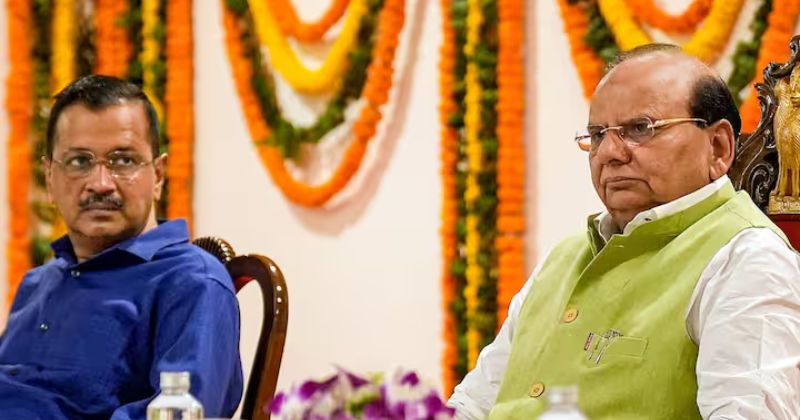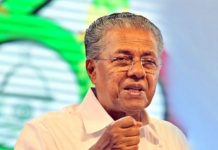
While declining immediate stay on Delhi government’s petition challenging the constitutional validity of the ordinance, the Supreme Court posted the matter for July 17 for examining whether the court can grant stay on a piece of legislation or not. A report by Mudit Mathur
The Supreme Court has agreed to consider the pleas for a stay on the operation of “Government of National Capital Territory (Amendment) Ordinance 2023”, promulgated by Union government on May 19, that divested the reins of services of IAS officers posted under the government of National Capital Territory of Delhi (GNCTD) from the elected government to its representative Lieutenant Governor. While declining immediate stay, the matter was posted for 17 July for examining whether the court can grant stay on a piece of legislation or not?
Issuing a notice on the Delhi government’s writ petition challenging the constitutional validity of the ordinance, to the Centre and Lieutenant Governor, a bench comprising Chief Justice of India DY Chandrachud and Justice PS Narasimha posted the matter on July 17 for considering the prayer for interim reliefs. The court directed the Union government and Lieutenant Governor to respond to the Interlocutory Application with an affidavit in opposition.
Earlier, Senior Advocate Dr Abhishek Manu Singhvi, appearing for the Delhi Government, sought for interim stay of the provisions. He contended that the Supreme Court’s Constitution Bench judgment underlined the importance of “triple chain of accountability” in governance. Referring to the provisions contained in Section 45K of the Ordinance, Singhvi pleaded that they are giving overriding powers to the Lieutenant Governor. He submitted that the Ordinance was contrary to the pillars of the Supreme Court judgment.
Singhvi attempted to persuade the bench by referring to instances “where the SC had stayed an Act of Parliament, leave aside an Ordinance.” “If an Ordinance tries to nullify the pillar of a judgement of the court, the Court stays it,” he submitted.

Singhvi further contended that the Ordinance has reduced the role of the elected government and the Chief Minister. Claiming that the Ordinance takes the powers away from elected representatives, the senior counsel said 437 independent consultants engaged by the Municipal Corporation of Delhi (MCD) had been fired by the LG after the Ordinance.
“Can your Lordships imagine a meeting where a Chief Minister sits in a minority, two bureaucrats say… we believe prima facie this proposal is illegal. First, those two will outvote the CM. They will then refer it to the LG who is the super CM,” contended Singhvi.
He added that “the pillar of your (SC) judgment is civil service accountability to the executive… federalism, decentralisation, democratic government. You might not even have Article 239AA. It’s a serious issue. Therefore, either Your Lordships may consider stay or as a first step, stay the para of 437 independent consultants… fired by the LG… Give a qualified stay and call it on Friday… Their salary is stopped, they are stopped from working…
Appearing for the Centre, Solicitor General Tushar Mehta said there are “some shocking facts”. “One of the persons removed is the wife of a sitting MLA. There are several party workers who were appointed without following the due process. I will have to place it on record,” he said, adding that the affected persons could always approach the high court.
Appearing for the LG, senior advocate Sanjay Jain said, “The question is the minister is signing these Article 32 petitions for and on behalf of the party workers who have been put in those 400 positions and various such matters have been challenged before Delhi HC also. The affected person should go before the HC.”
The CJI, however, told Mehta, “You have a look at the prayer for interim relief… we will take it up on Monday (July 17).”
The AAP government’s plea, which prayed for an immediate interim stay, says the “Ordinance… completely sidelines the elected Government, i.e., the GNCTD, from control over its civil service.” The petition pleaded that the ordinance does so without seeking to amend the Constitution of India, in particular Article 239AA of the Constitution, from which flows the substantive requirement that power and control in respect of Services be vested in the elected government.
The Delhi government termed the Ordinance “an unconstitutional exercise of executive sanction that… violates the scheme of federal, democratic governance entrenched for the NCTD in Article 239AA…” In a separate plea, the petition challenged the constitutionality of Section 45D of the ordinance.
The petition highlights that the ordinance was brought out a week after a Constitution Bench of the Supreme Court pronounced that the Delhi Government has power over Entry 41 of List II (services). It is argued that through the ordinance, the Central Government has in effect overturned the Supreme Court’s verdict.
The ordinance is challenged as it is violating the scheme of federal, democratic governance entrenched for the NCTD in Article 239AA of the Constitution. It is further argued that the Ordinance negates the principle of federalism and undermines the primacy of the elected government.
“The principle of collective responsibility in a democracy – incorporated in Article 239AA(6) – requires that the elected government be vested with control over officials posted in its domain. In the federal context, this would require that such control be vested in the regional government – i.e. the GNCTD under Article 239AA – for matters in its domain. This essential feature was secured for the GNCTD by this Hon’ble Court’s 2023 Constitution Bench judgment, and is now sought to be undone by the Impugned Ordinance”, states the petition filed through Advocate-on-Record Shadan Farasat.
Congress on the horns of dilemma
The Congress is in dilemma over the precondition set forth by Aam Aadmi Party for joining opposition ranks that it has to publicly denounce Delhi Ordinance for control of services in Delhi.
The second meeting of opposition leaders is scheduled for 17 July in Bengaluru, Karnataka, three days before the Monsoon session of Parliament to chalk out a strategy to take on BJP in upcoming parliamentary elections in 2024. The Congress Party has sent invitations to leaders of opposition parties for the meeting including Aam Aadmi Party but it is uncertain whether it will join the meeting or not?
The difference between the AAP and the Congress surfaced during the first opposition meeting in Patna held on June 23, which was attended by 16 parties and was hosted by Bihar chief minister Nitish Kumar.The parties vowed to put up a united fight against the BJP in 2024 and finalise plans in the next meeting initially planned in Shimla, but later changed to Bengaluru due to sudden floods in the hilly state.
The parties which attended the meeting included the Congress, Trinamool Congress (TMC), AAP, Nationalist Congress Party (NCP), Shiv Sena (UBT), Dravida Munnetra Kazhagam (DMK), Jharkhand Mukti Morcha (JMM), Samajwadi Party (SP), National Conference (NC), Peoples Democratic Party (PDP), CPI, CPI(M), CPI(ML), Janata Dal-United (JDU) and Rashtriya Janata Dal (RJD) .
AAP convenor Arvind Kejriwal attended the Patna meeting but he skipped the joint press briefing after the discussion convened to send out a message of opposition unity. Couple of hours later, the AAP said in a press release that it will be cautious of the Congress’s “silence”, which raises “suspicions” about its “real intentions”. “It’s high time that Congress decides whether it stands with the people of Delhi or with the Modi government,” the AAP said.
On Friday, Kejriwal reiterated the party’s position after the Patna meeting as he told reporters that while the invitation has come from the Congress to attend the Bengaluru meeting, the AAP is still waiting for the Congress’s public statement denouncing the Delhi ordinance 15 days before the commencement of the Parliament session.
Reacting to Aam Aadmi Party chief Arvind Kejriwal’s statement, the Congress national spokesperson and former MP, Udit Raj, said that setting preconditions is not the way to move further. “If they (AAP) want to remove Modi or BJP in coming elections they should join hands with all opposition parties. Look at the case of Rahul Gandhi being disqualified as an MP, or the action against Senthilbalaji in Tamil Nadu. All regional parties including the Congress have a lot of issues and if they all make preconditions then what will happen?”











